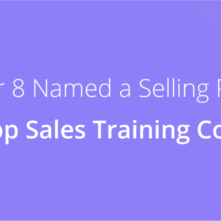Addressing Gaps in Call Coaching [Webinar Recording]
Addressing Gaps in Call Coaching
[Webinar Recording]
[Webinar Recording]

This feels like a big deal…
Twenty (cough) ish years ago during my first week as a Sales Manager, my colleagues (and assigned hazers) dropped a stack of Selling Power magazines on my desk. As the “fresh meat”, it was my job to distribute them on the floor.
That’s right kids, real paper magazines.
I was a little in awe. Naturally, I pretended to bemoan the assignment, but secretly I was thinking, “There’s a whole magazine about sales?!” I studied the man on the front cover. I flipped to the “big deals” section, scanned the sales tips, and devoured the success stories. This was seriously cool. My dream got locked and loaded…could I be on these pages one day?
Nope.
Right after starting Factor 8 and seeing great client successes, I applied to be included in Selling Power’s “Top 25 Sales Training Companies” list. Denied. For three straight years. I got an honorable mention once (I think they felt sorry for me), they offered me a guest blog or two too.
Fast forward to 2021: We expanded from two to fifteen people, added an eLearning platform, The Sales Bar, changed our model, added custom tracks, brought in serious leadership talent, and spun up #GirlsClub. I was too busy to apply, but Ted Martin and Amy Wunderlich weren’t.
Ladies and Gentlemen, I’m so very proud to announce that my dream has come to fruition. Factor 8 has been named as one of Selling Power’s “Top 25 Sales Training Companies”!
I feel like I will literally burst with pride.
And it’s so much better sharing the glory with my Factor 8 family and clients who helped us get here. Stay tuned for the acceptance speech, in addition to the Academy, I’d like to thank…
Melissa Murillo, Dave Brown, Derek Few, Dharmesh Shah, Jess Dodge, Dirk Foreman, Eileen Wiens, Wanda Pansky, Heather McNeive, Brett Honerkamp, Glenn Harvey, and Hugh Jones for taking the time to share your experience working with Factor 8 and helping us make the list!
And my wonderful Factor 8 family; your continued hard work and dedication to our clients!
[Webinar Recording]
[Webinar Recording]
[Cheat Sheet]

Recently, one of the awesome women in #GirlsClub shared that she wanted to move all the way up the sales ladder before trying management. She wanted to be credible to her future team. She had also learned the hard way that just because she could DO sales didn’t mean she could TEACH sales. I was so freaking proud of her at that moment. She knew her strengths and she was not blindly reaching for the promotion. It also gave me pause.
Do we need to do every role in sales before managing? I didn’t. I sold for a short time and then leap-frogged into sales (see my story here).
Truth is, management is not a fit for everyone – regardless of your sales prowess. In fact, maybe because of your sales prowess. I’ve seen top reps make horrible managers and “B” reps be amazing coaches.
It’s really more about your natural behaviors and values than skills. Our (amaaaazing) Marketing Director at Factor 8 is very actively NOT seeking a management role. My bestie says the same thing, “Hell no! Life is better when I’m in charge of my own destiny and not in charge of anyone else’s crap.” My bestie may have a mouth like mine. 😉
So if you’re wondering, “Is sales management right for me?”, start by asking yourself a few questions:
Flipside: As a manager, you actually have LESS control over your daily life, workload, task list, end results, and paycheck. You’re basically being judged by and paid on the average performer on your team. If that last sentence gave you hives, keep driving your own sales car; don’t trade it in for the sales school bus.
If you’re still not sure if sales management is right for you, join me (or watch the recording) for a free session on “Tips To Get Promoted To Sales Manager” where I’ll share my top tips to help you determine if management is meant for you and, if it is, how to get that promotion.
[Webinar Recording]

Difficult conversations are often dreaded and sometimes even avoided, but hey, let’s be honest, these are conversations that we need to have. Before I became Lauren’s sidekick (AKA Executive Assistant), I was in sales. I’ll be honest, I would find myself occasionally avoiding difficult conversations, sometimes at all costs, but that’s not going to help us grow and get results. LB was joined by four amazing ladies on a panel talking about how to overcome the temptation to avoid a conversation, how to prepare for the talk, and what to expect.
Our panelists included:
Shianne Sampson who has been working with great startups and technology companies across the U.S. to help build out world-class sales teams. She’s currently the VP of Sales & Customer Experience at PetDesk in San Diego as well as a freelance consultant.
Wendy Mitchell-Covington, National Vice President of Sales Success at TriNet, who is a high-energy, polished strategist who builds and scales sales organizations. Wendy has spent the last 20 years in the HR outsourcing space funneling her expertise into helping America’s businesses improve and thrive.
Brenda Roper who is the VP, Global Sales Enablement at Thomson Reuters based in Minneapolis. She’s also held many sales leadership roles but her passion is seeing behavior change as a result of training – and she’s trained over 15K sales people!
Natalie Servino who is the VP of Marketing for Chorus.ai. where everyday she gets to help B2B sales professionals win more. She oversees all marketing and sales development for Chorus, including product marketing, demand generation, and communications.
Lauren used the Factor 8 COACHN℠ Model framework as a guide. This model is used for all sales manager meetings to help leaders provide consistency and embody coaching best practices. For difficult conversations, it’s called the E-COACHN℠ Model.
The “E” reminds us to maintain an employee’s self-esteem. It also reminds us there are four legs of research to do:
Once prep is done, we can follow the COACHN℠ Model to guide the conversation:
The panel shared so many awesome tips and stories. Here were a few that stood out:
1. How do you give feedback up the ladder? To superiors, leadership, or your boss.
Always start with your end in mind. What outcome are you seeking? Prepare, have an outline, have someone you trust review and practice. Ask your boss if you can have an open conversation to help propel the business, relationship or whatever it is further. Tell her or him that you have been hesitant to bring this up (if that is true) and that you are seeking to improve whatever it is you are going to discuss AND then go for it!
Remember, your boss can’t read your mind. Everyone is human and makes mistakes. Be prepared to hear feedback that you may not want. How will you react? Do your best to take the feedback as a gift, even if it is something that doesn’t make you feel good.
“Feedback is a gift” – This came up many times during the webinar. What an amazing perspective to help all parties navigate giving and receiving feedback.
2. How can you use difficult conversations with clients as an opportunity to strengthen the relationship?
Many difficult conversations with clients occur because the company that you work for can’t or won’t fulfill something the client wants or needs. Sometimes these occur because expectations were not met.
Honesty and timely communication will actually strengthen a relationship, versus harm it. The worst thing anyone can do is avoid the crucial conversation.
3. What is the best way to have these conversations with your boss. For example if you disagree with an approach or need to “manage up”.
This one is tricky because it really depends on what type of boss you have, you’ll need to gauge your boss’s openness to feedback and these types of conversations. That being said, start with clear expectations. I use a simple format of expectation setting which is: Here is what you should expect from me, and what should I expect of you? They will almost always say the right things: support, transparency, accountability, etc. If not make sure they cover what you need by asking the right questions. Then, once expectations are clear you can use those expectations to align on feedback, similar to the roleplay we did in the webinar. Let them know where expectations aren’t being met and be specific with examples, then provide actionable solutions. The most important part of managing up is for YOU to come with solutions, don’t just come with issues and expect them to solve. If you disagree with their approach it means you are not aligned on what protocol/expectations should be, so start there.
4. Do you have any tips on having difficult conversations remotely, e.g. via Zoom?
Eliminate distractions and make sure you plan as you would for face-to-face. Then always make sure that your video is eye-level and that you maintain eye contact. The rest conveys just as well through video as it does in person. If this is a conversation that is HR-related or could end in termination, you should have HR present or record the session for documentation.
5. How do you acknowledge a counter argument and listen without agreeing?
Depending on the situation, you might not have to agree, but you likely need to address the disagreement and how to move forward. So to start, you need to be OK with disagreement. If the disagreement is done the right way it can actually be productive and build trust! There is a time and place for rude and blunt disagreement, for example at political rallies and debates, however, for business professionals, the polite and respectful approach is always the right way to go. Here are some tips to make this type of difficult conversation productive:
6. How to disagree with your boss without getting fired.
We already know the complexities and tips to improve difficult conversations, but initiating one with your boss might be intimidating. However, it doesn’t have to be! If you have a good manager, disagreeing should not be an issue, it should just be another constructive conversation that you have. However, if you do not have a manager that is open to others’ opinions, here are a few additional tips.
I hope you found these tips helpful!

Coaching is a tough skill for most sales managers. But if you’re used to being in the office and are now managing a virtual sales team, you have some added hurdles. These tips are for you.
(Be sure to keep scrolling to hear my manager coaching tips at the bottom of this article)
In sales, we use the term coaching too often. We mean it for leaders who use a question-based or learning-based approach. The helpers and askers vs. the domineering tellers. Coaching as a style is different from dedicated rep, skill, or call coaching. When we clearly define when we’re doing sales coaching vs. our regular role of answering questions, running a huddle, or doing a 1:1, it’s easier to identify when to activate coaching skills.
When we were in the office, we could “drive-by coach” when we heard sales reps on the phone doing the good, the bad, and the ugly on calls. Now we need a dedicated hour with each rep one to four times per month. How often, exactly? Coach new reps and “B” reps at least twice a month. Prioritize your “A” and “C” reps next, with the “D” reps coming in last. Beware, focusing on the squeaky wheel!
If you don’t have call recording in place, prioritize it now. It will cut the time required for coaching by more than half. Have reps find their own recordings for coaching, mark them, and bring them to the call coaching session.
If you reframe coaching into time to build your reps’ skills, their engagement, and your relationship with them instead of winning deals, you’ll be on the right side of call coaching and have higher-quality interactions and outcomes.
Zoom works best for playing call recordings. Listen to the call, then do the call coaching. Using video will allow you to connect with the rep, gauge their facial expressions, and have a “face-to-face” conversation where you’re building rapport, not just skills.
Schedule recurring meetings so you can keep the conversation going. We have a new BDR on the team who gets coached 2-3 times every week. We work on 1-2 skills at a time until we have it mastered and then we move on.
If you don’t have a great coaching tool like Ambition, ExecVision, Chorus, or Gong that keeps you aligned to a scorecard and standard of what “good” looks like, create your own scorecard and model. Go nuts and do it with a few managers, if you have access. For every rep skill we teach in The Sales Bar we include a mini Q&A scoring form and coaching questions. We also teach the COACHN℠ model – a standard approach to every coaching interaction that helps things become routine and easier.
You know I sell training right?! Seriously, the number one most difficult skill to train sales managers is call coaching. So get some help deciding what to coach, how to coach, who to coach how often. Build some confidence in your ability to coach (remote or face-to-face) and you’ll look forward to it much more. Funny how it will get prioritized that way.
[Webinar Recording]

Natalie Severino
VP, Marketing | Chorus.ai
Natalie is the VP of Marketing for Chorus.ai. Passionate about elevating the craft of Sales and helping B2B sales professionals win more, Natalie enjoys writing and speaking about sales technologies and trends. Natalie loves technology – she started her career at leading technology companies like Intuit, Logitech, and Trend Micro and then found a passion for building technology start-ups at ClearSlide, getTalent, and now Chorus. She oversees all marketing and sales development for Chorus, including product marketing, demand generation, and communications.

Brenda Roper
VP, Global Sales Enablement | Thomson Reuters
Brenda is currently the VP, Global Sales Enablement at Thomson Reuters based in Minneapolis, MN. In addition to sales enablement positions, she has also held various sales roles throughout her career including VP Sales and Business Development and Master Principal Sales Consultant. Brenda has trained over 15,000 salespeople and has a wealth of experience creating successful sales and presales training programs. Her passion is to see behavior change as a result of training, to create successful sales teams, and to drive revenue!

Wendy Mitchell-Covington
National Vice President, Sales Success | TriNet
Wendy Mitchell-Covington, National Vice President of Sales Success at TriNet, is a high-energy, driven sales executive who possesses a proven track record of outstanding results. She is a strategist who has successfully built and scaled sales organizations. Throughout an extensive sales and leadership career, she has been committed to attracting, developing and retaining top talent. She believes top-performing sales professionals are the engine that drives every flourishing company.
Wendy has spent the last 20 years in the HR outsourcing space funneling her expertise into helping America’s businesses improve and thrive.

Shianne Sampson
VP of Sales & Customer Experience | PetDesk
Since 2009, Shianne has been working with great startups and technology companies across the U.S. to help build out world-class sales teams. With her M.A. in Organizational Leadership and over 20 years in sales, she founded Yelp University and the Yelp Sales Development Program and has trained over 4000+ salespeople and hundreds of sales leaders. Shianne has worked with several great companies such as Yelp, Zenefits & Varsity Tutors in San Francisco, Seattle, St. Louis, and Scottsdale, Arizona. Shianne is currently the VP of Sales & Customer Experience at PetDesk in San Diego as well as a freelance consultant that specializes in helping SaaS companies turn their sales teams around, increase revenue, and train their sales leaders to be the best in the business. She is also the author of the published book Broken to Badass and a proud single mother of six.